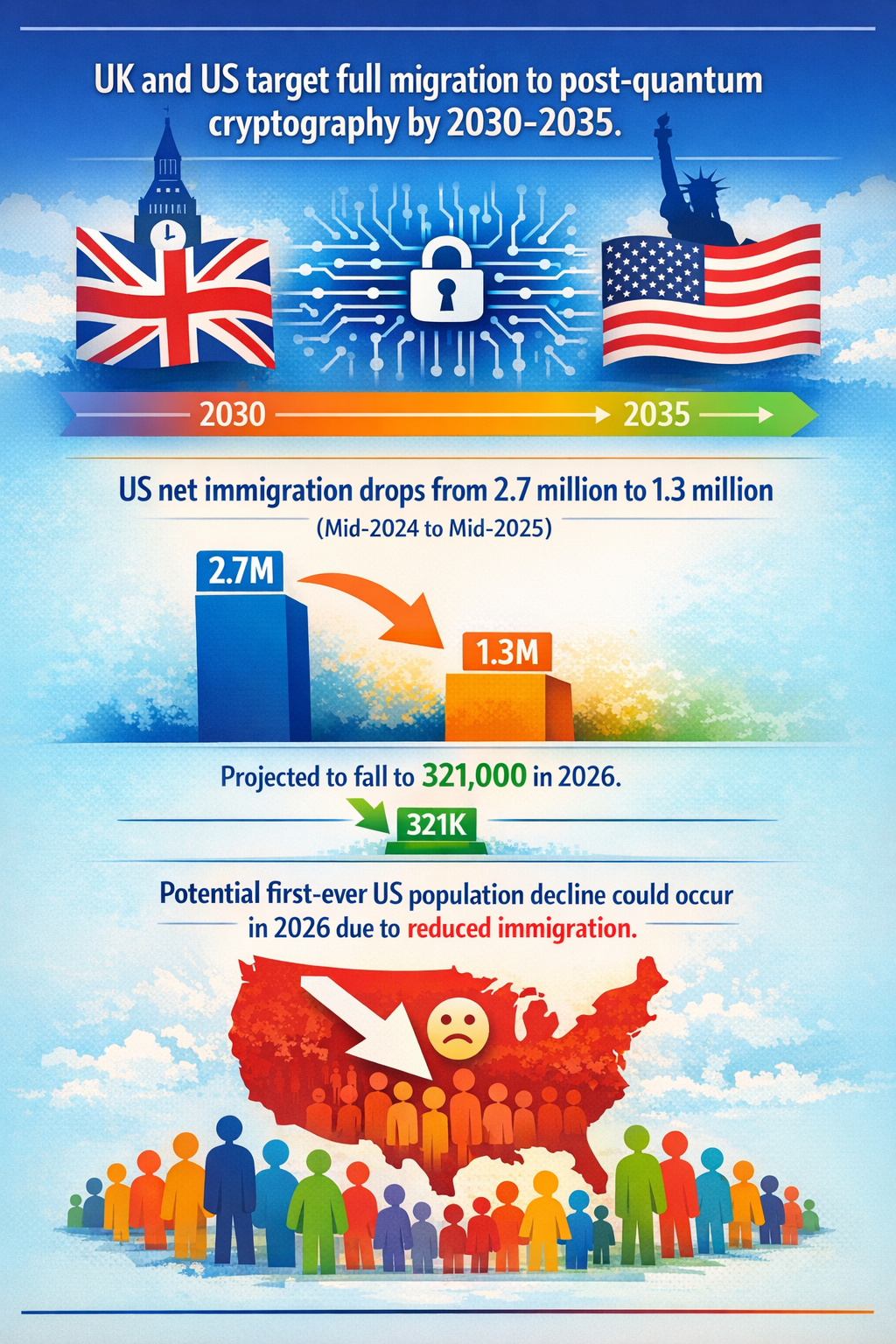Post-Quantum Cryptography and the Emerging Global Shift in Digital Security
Advancements in quantum computing threaten to render current encryption methods obsolete, prompting an unprecedented global migration toward post-quantum cryptography. Despite growing awareness of quantum risks, the accelerating timelines for cryptographic transition and the uneven regulatory responses worldwide introduce a weak signal of disruption that could simultaneously transform cybersecurity, finance, IT infrastructure, and national security over the next 5 to 20 years.
What’s Changing?
The computing power promised by quantum technology, particularly algorithms like Shor’s algorithm, poses a direct threat to the foundational cryptographic systems used across the internet today, especially RSA (Rivest-Shamir-Adleman) encryption. Shor’s algorithm can efficiently factor large integers, thereby breaking RSA encryption, which secures everything from online banking to government communications (Databusiness Central).
In response, regulatory bodies in the UK, US, and other advanced economies have set ambitious deadlines to transition to post-quantum cryptographic standards by the early 2030s (dig.watch). However, this global shift is far from uniform. Many developing nations lag behind, lacking the regulatory frameworks and infrastructure to migrate securely and timely. This creates an uneven global patchwork of cryptographic capabilities that might expose critical vulnerabilities, especially in cross-border digital systems.
The transition to post-quantum cryptography (PQC) is more than a simple software upgrade. It involves:
- Architectural redesigns of hardware and software systems to accommodate new encryption algorithms.
- Extensive validation and certification processes to ensure interoperability and security compliance.
- Significant capital investment in IT infrastructure modernization.
- A re-skilling of cybersecurity professionals to handle quantum-resistant protocols.
Adding complexity, geopolitical tensions may influence how nations collaborate or compete in quantum research, potentially affecting the pace and openness of PQC adoption. Countries actively investing in quantum computing technology may withhold advances or tighten export controls, creating strategic advantages or digital divides.
Why Is This Important?
The successful deployment of PQC protocols will be critical to maintaining the integrity, confidentiality, and authenticity of critical digital services. Failure to migrate effectively might expose sensitive data to retroactive decryption or real-time cyber intrusions once sufficiently powerful quantum computers come online.
Financial institutions, government agencies, healthcare providers, and critical infrastructure operators could face existential risks from compromised encryption networks, potentially disrupting operations or undermining public trust. More broadly, a fragmented global cryptographic landscape might:
- Increase systemic cyber risks due to inconsistent or outdated encryption policies.
- Create legal and compliance challenges, especially for multinational corporations operating across jurisdictions with diverging PQC timelines.
- Intensify digital sovereignty debates as countries seek to control encryption standards to protect national interests.
Furthermore, the transition period presents an exploitable window where hybrid encryption schemes – combining classical and post-quantum algorithms – may still harbor unknown vulnerabilities. Threat actors could exploit this complexity, increasing the likelihood of supply chain attacks or zero-day exploits.
Implications
The quantum cryptography transition could drive broad technological innovation and shifts in strategy across sectors:
- Technology and Cybersecurity Firms: Companies that develop or integrate PQC solutions stand to gain market advantage but must contend with a rapidly evolving standards landscape and demand for expert talent.
- Financial and Insurance Industries: These sectors may need to reevaluate risk models around data breaches and adopt quantum-resistant protocols faster than others to protect sensitive transactional data.
- Governments and Regulators: Policymakers must coordinate internationally to harmonize PQC standards and facilitate knowledge sharing while balancing national security concerns.
- Supply Chain and Critical Infrastructure: Enterprises will need comprehensive audits to identify cryptographic dependencies and phase out vulnerable systems incrementally without service disruption.
Strategic intelligence functions should pay attention to:
- Emerging alliances or rivalries shaped by quantum capabilities and cryptographic control.
- The economic impact of delayed PQC adoption on global commerce and digital innovation leadership.
- Potential for ‘Q-Day’—the point at which quantum computers can break classical encryption—to trigger cascading disruptions if not preemptively mitigated.
Proactive leadership in PQC transition requires integrating ongoing intelligence on quantum computing advances, regulatory developments, and cryptographic ecosystem readiness into enterprise risk management frameworks now.
Questions
- How prepared is your organization’s IT infrastructure for migration to post-quantum cryptography, and where are critical vulnerabilities likely to appear?
- What partnerships or collaborations can be established with governments, academia, and industry groups to accelerate PQC adoption and knowledge sharing?
- How might geopolitical developments around quantum research influence your sector’s risk profile and regulatory compliance obligations?
- To what extent should hybrid classical/post-quantum encryption be deployed as an interim measure, and what are the inherent security trade-offs?
- What workforce adjustments and skills development initiatives are necessary to operationalize PQC technologies effectively?
Keywords: post-quantum cryptography; quantum computing; Shor's algorithm; cryptographic transition; cybersecurity; RSA encryption; digital security; national security
Bibliography
- Shor’s algorithm threatens traditional RSA-based encryption, prompting global migration toward post-quantum cryptography. Databusiness Central. https://databusinesscentral.com/industry-outlook-2026-quantum-computing-moves-toward-early-commercialization/
- Regulators in the UK and the US have set timelines for shifting to post-quantum cryptography, aiming for full migration by 2030-2035. dig.watch. https://dig.watch/updates/when-q-day-could-break-modern-encryption

